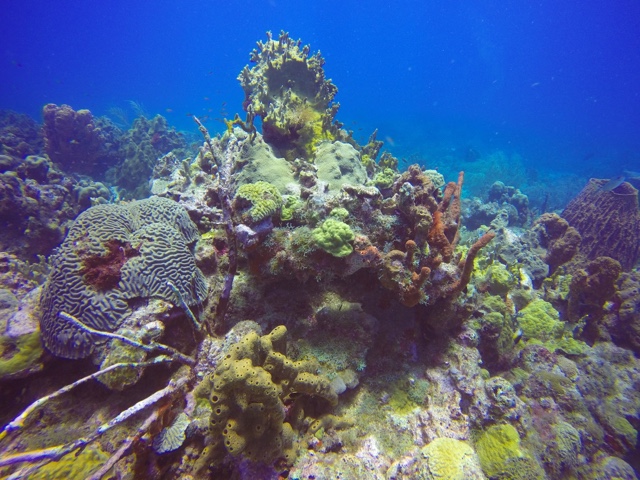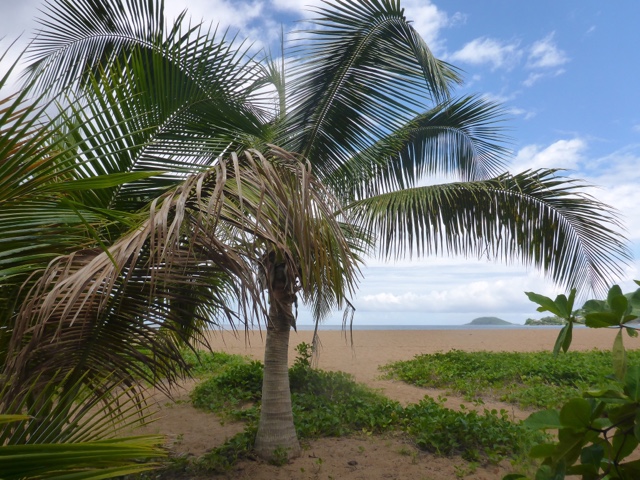We went to Deshaies on the north west of the island - a beautiful bay, crystal clear water and a quaint little town with a couple of mini markets and plenty of cafes and restaurants.
Deshaies bay, as seen from the interestingly rustic dinghy pontoon.
Although small, Deshaies had three dive schools - inspired by the excellent snorkelling at the sides of the bay, we checked them out and booked a couple of dives with Tropical Sub - we enjoyed the dive so much that we ended up doing the PADI Advanced Open Water with them which really was excellent. We opted to include a night dive as well as a trip to Pidgeon Island, the Jacques Cousteau Marine Reserve which is about 10 miles south of Deshaies.
The Cousteau Reserve - the water really was like an aquarium.
The Lion Fish, an invasive species that has no predators in these waters, and because it's a reserve, they can not be hunted as in the other islands. They do look spectacular though.
The Trunk Fish - my personal favourite.
And a Hawksbill Turtle - everyone's favourite!
The Great Man himself - Jacques Cousteau. There are various rumours surrounding the missing hand - apparently it may have been hooked by a yacht anchoring illegally, picked up by the Underwater Gendarmes who allegedly patrol and give €150 fines to divers who touch anything living underwater, and now the Marine Reserve, Dive Schools and Gendarmes can't agree on who should lift the statue to replace the hand.
Despite spending so much time under water, we did manage to visit the Deshaies Botanical Garden - a 20 minute walk up a steep hill, but certainly worth the effort.
A selection of the flowering plants, and a hummingbird
The Travellers' Palm - apparently you can always find a drink of water at the base of the leaves, not too sure how easy it would be to get up there and drink it though.
Some really big trees with buttress roots
And a peacock doing a fine job of herding flamingoes.
Being part of France, Guadeloupe has a great selection of walking paths - we took one from Deshaies over the hill to Grande Anse d'Arlet, the absolute epitome of a Caribbean Beach.
The view down through the trees to Grande Anse D'Arlet. Apparently the setting for the uk TV series Death in Paradise.
It certainly is a paradise.
Although we loved Deshaies we felt we needed to see another part of Guadeloupe so we set off south to the Iles des Saintes - and it was fabulous.
Iles des Saintes - we are on one of the mooring buoys in the distance.
The high street - you can rent a golf buggy here to tour the island.
As usual on the islands, there was evidence of the old Anglo French Hostilities. The bay is overlooked by Fort Napoleon from one side, so we set off to have a look round.
The view from the top - Cabrits Island is on the far right, and the Pain de Sucre rock is at the tip of the main island.
Fort Napoleon. Originally known as Fort Louis, it was destroyed during one of the many Anglo French battles and reborn as Fort Napoleon - by that time hostilities had ceased, so this building has never seen active service.
Back on the water, the Pelicans were a source of constant entertainment.
This one is going for a gentle landing, but you would not want to be in the way when they dive for fish!
There are three mooring areas, we spent two days by the town then headed round to the Pain de Sucre bay - a very peaceful spot.
And a good place to admire the sunset.
Our last stop in the Iles des Saintes was Cabrits Island - the mooring was not as comfortable as there was quite a swell but again it was beautiful and gave us an opportunity to walk up to Fort Josephine - which had seen active service!
Looking back towards the main island from Fort Josephine, with the Pain de Sucre visible on the right.
The remains of the fort - currently home to lots of goats.
View from the Fort - Nautilus visible in the gap on the Isle de Cabrits mooring.
So after a couple of wonderful weeks in Guadeloupe, and a final sunset in the Saintes, and then it's back to Antigua for the race week next.






























No comments:
Post a Comment